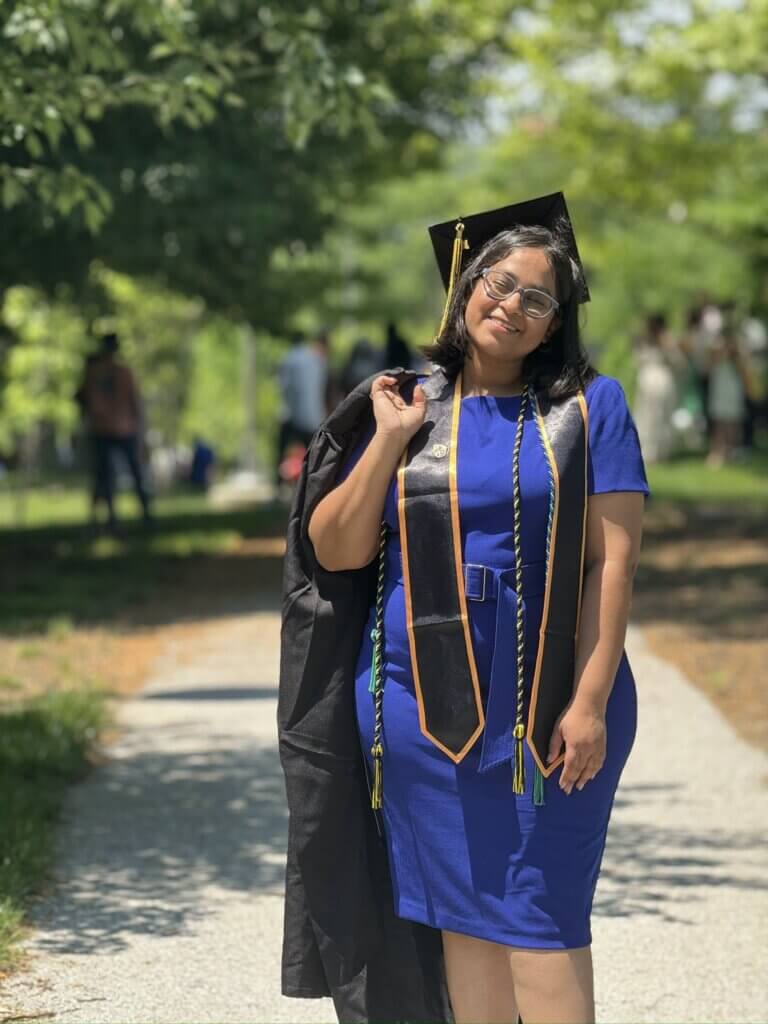In a recent episode of the UMBC Mic’d Up podcast, we sat down with Lalitha Bikkumalla, M.P.S. ’24, Health Information Technology, to chat about healthcare data management.
Lalitha’s story is a fascinating journey from her undergraduate studies in dentistry in India to her current career in health IT in the United States. This episode sheds light on the growing field of health information technology and the innovative ways it is transforming healthcare.
A Diverse Academic Background
Lalitha Bikkumalla began her academic career in India, earning a Bachelor of Dental Surgery. After graduation, she worked as a healthcare management specialist at her dental college. Her desire to learn more about the intersection of healthcare and technology led her to pursue a Master’s degree in Health Information Technology at UMBC.
Lalitha’s move to the United States was her first experience living abroad. She described it as both thrilling and enriching, exposing her to new cultures and educational experiences. The transition from a clinical background in dentistry to health IT allowed Lalitha to explore healthcare from a different perspective.
The Appeal of Healthcare Data Management
The Health IT program at UMBC drew her in because of its structured curriculum, which offers a blend of theoretical knowledge and practical application. The program gave her a solid foundation in key areas such as data management, health informatics, medical billing, and healthcare regulations. These skills are critical for ensuring accurate medical coding and billing, which are essential components of the healthcare industry.
Lalitha highlighted the importance of understanding both healthcare and IT, stating that this dual focus makes health IT a dynamic and impactful field. She sees health IT as a growing area with numerous career opportunities due to the increasing integration of technology in healthcare.
Hands-On Learning and Capstone Experience
The hands-on learning approach was one of the most valuable aspects of Lalitha’s education at UMBC. She emphasized the importance of practical projects that allowed her to apply classroom knowledge to real-world situations. Lalitha’scapstone project was a significant part of her learning experience. It focused on using electronic health records (EHRs) and machine learning to address public health challenges related to Alzheimer’s disease. Her project aimed to develop and validate machine learning models that could predict individuals at high risk of developing Alzheimer’s, thereby enabling early intervention.

Career in Health IT
Since graduating, Lalitha has been working as a medical billing associate. She credits her master’s degree for preparing her well for this role by equipping her with the necessary technical skills and knowledge. Looking ahead, Lalitha aspires to take on leadership roles in health IT, focusing on data accuracy and integrity. She is also interested in exploring the use of advanced analytics and artificial intelligence (AI) to enhance patient outcomes and operational efficiency in healthcare settings.
The Role of AI in Health IT
Lalitha believes that AI has the potential to revolutionize health IT by improving patient care and advancing public health. She is particularly interested in how health professionals can integrate AI into personalized medicine and preventive care. AI can provide a more nuanced analysis of patient data, leading to better diagnostic accuracy and more effective treatment plans.
Advice for Future Health IT Professionals
Lalitha offers valuable advice to those considering a career in health IT. She emphasizes the importance of engaging in practical projects and taking full advantage of the opportunities to apply theoretical knowledge in real-world settings. Lalitha also underscores the value of networking with peers and faculty, which she found essential for support and guidance throughout her program.
Conclusion
Lalitha’s journey from dentistry to health IT illustrates the diverse opportunities available in this evolving field. Her experiences highlight the importance of hands-on learning, the potential of AI in healthcare, and the need for dedicated professionals who can bridge the gap between healthcare and technology. Lalitha’s story is inspiring and informative for those interested in making a difference in healthcare through technology.
Listen to the full podcast episode embedded below to learn more about UMBC’s Health Information Technology program. Or listen on your favorite podcast player.
